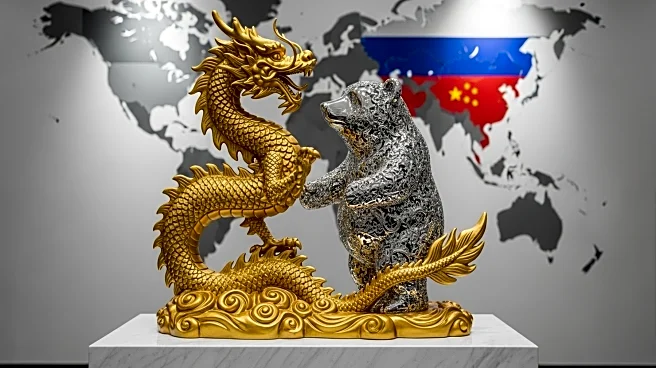What's Happening?
Russian President Vladimir Putin spent a week in China, attending a summit and military parade alongside Chinese President Xi Jinping and leaders from other countries, including India and North Korea. This visit highlights the strengthening relationship between Russia and China, as both nations appear to be aligning more closely in the face of global tensions. The summit comes at a time when European leaders are planning to bolster Ukraine's defenses against potential future invasions, while Russian forces continue their military actions in Ukraine. Alexander Gabuev, director of the Carnegie Russia Eurasia Center, notes that the relationship between Russia and China has become increasingly asymmetrical, with China holding more economic and technological leverage over Russia.
Why It's Important?
The growing alliance between Russia and China poses significant implications for global geopolitics, particularly for the United States and its allies. As China provides substantial economic and technological support to Russia, this partnership could challenge U.S. influence and strategic interests. The alignment of these two major powers may complicate efforts to isolate Russia diplomatically and economically, especially as they present an alternative global order to countries disenchanted with U.S. policies. This development could also impact the ongoing conflict in Ukraine, as Russia's strengthened ties with China may embolden its military actions.
What's Next?
The deepening Russia-China relationship is likely to continue influencing global diplomatic dynamics. The United States and its allies may need to reassess their strategies in dealing with this alliance, particularly in terms of economic sanctions and diplomatic negotiations. Additionally, the U.S. may face challenges in maintaining its influence in regions where China and Russia are expanding their reach. The situation in Ukraine remains precarious, with potential implications for European security and international relations.
Beyond the Headlines
The Russia-China partnership raises questions about the future of global governance and the balance of power. As these nations promote an alternative to the U.S.-led international order, there may be shifts in global alliances and economic partnerships. The ethical and legal dimensions of this alliance, particularly in terms of human rights and international law, could also become points of contention in global forums.









